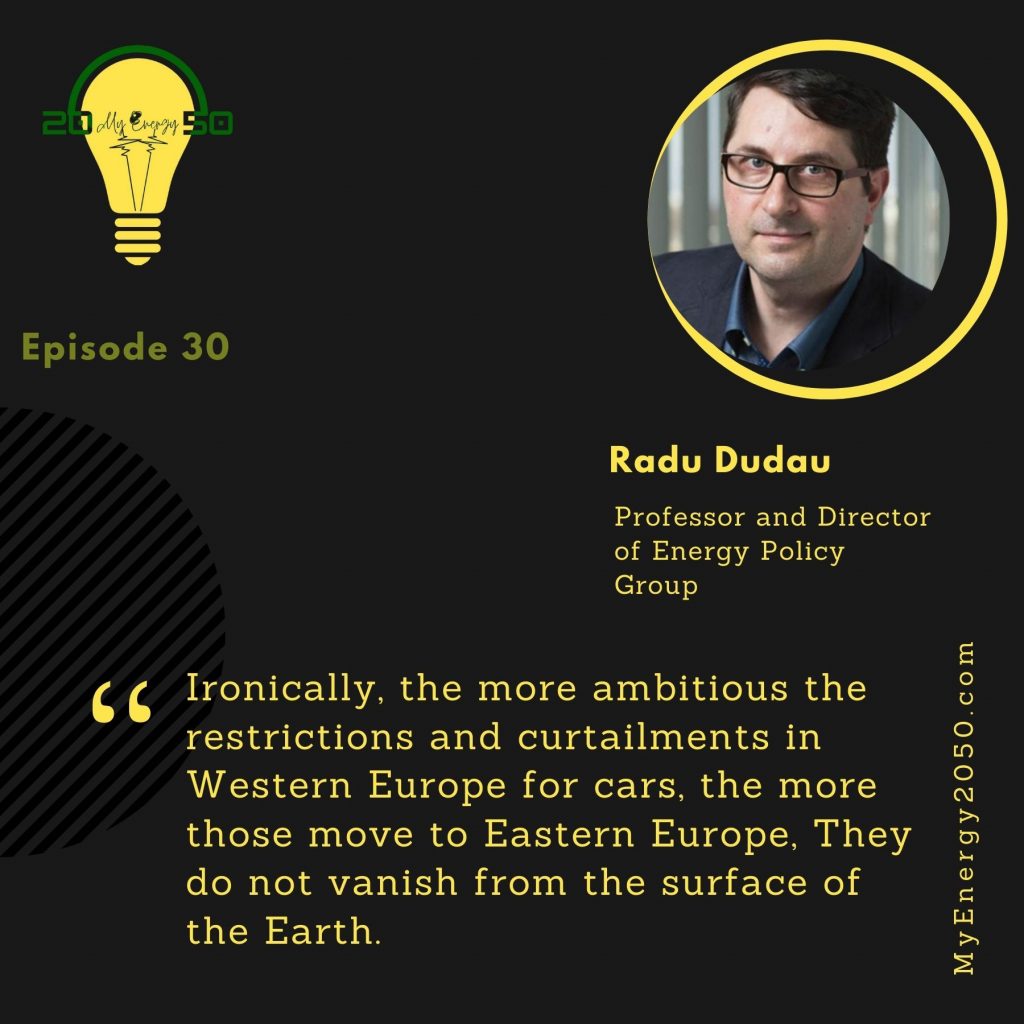This week we speak with Radu Dudau, he is the co-founder and director of the Energy Policy Group in Romania. He is also a professor of International Relations, and has extensive academic and research positions from the United States (Harvard), the UK (Oxford) along with continental universities in Germany, Denmark and Romania.
This week we gain an insight into how Romania is tackling the energy transition. As we learn Romania holds high potential to build a strong renewable energy portfolio with a good natural environment in the Danube Delta and investor interests. The European Commission wants to push the country towards 40% of renewables in the next few years. In short, Romania holds the potential to shift away from coal and embrace renewables.

Before you say, this episode is not for me, because, well, who really cares about Romania? Hear me out as to why I think Romania is so important to understand how and why it represents other countries struggling to develop their economies, attempting to lift people out of poverty and build a modern and sustainable energy system.
As Radu points out, half of the population lives in the countryside and as my week-long trip through the country showed me, there is a lot of poverty and difference between regions. Romania represents both Eastern European EU member states, but also other Balkan countries who hang onto coal and nuclear power. As we discuss, the money from the EU means financing the transition is not much of an issue, but what is, is the transparent and professional capacity by governments and stakeholders to properly implement projects. What we come to understand in this episode what is happening in Romania and what the impact of the EU is in the country. This will help is to understand broader challenges in both EU Eastern countries and in other Energy Community countries in the Balkans.
As I mentioned I was in the country for over a week. My partner and I took the van and drove from Budapest to the Black Sea. We camped in the van wherever we ended up at the end of the day – or even at night. All I can say is the country is beautiful and holds an impressive landscape from the views of the Black Sea with its windfarms to the biting insects of the Danube Delta. The mountains of course, are tremendous. But so are the rivers, with us rafting down one, and having a very good time thanks to the extra water being released from a reserve facility being used to produce extra electricity.
I have to say the biggest surprise to us, and this is why we should all hold out hope that Romania can make the energy transition happen, is the roads are outstanding. It was a paradise to drive. We did 3000 km from Budapest to the Black Sea, and in Romania we only came across less than 10 potholes. There are more potholes in my neighborhood in Budapest than what we saw in all of Romania. And here, I just want to acknowledge my carbon footprint, but hopefully, by bringing my experiences to you, I can begin to justify just a bit my penchant for travel and seek redemption through this podcast.
When we were next to the Black Sea and saw a huge wind farm in the Danube Delta it got me thinking I needed to contact Radu. So on our way through Bucharest we stopped in and he graciously gave this an interview.
I have two key takeaways. First, as Romania’s roads indicate, miracles can happen. But as Radu points out, it is not a question of money to build a green energy solution, but competency and transparent governance. An effective transition requires not just a situation or a site that needs assistance, but effective professional capacity on the ground with the money being well spent.
The second, is that while we discuss energy policies, and both of our research is around energy, the subject matter has now changed to be about climate change targets. The energy system for me, was never an isolated system, but an arena where a multitude of processes and issues collide and can be analyzed in a constrained manner. In this interview we delve into energy policies, but these are connected to the climate change goals that are necessary to implement.
Key points in the interview:
- Energy and climate policy – shift in energy towards climate- tight connection
- Romanian energy landscape – role of buildings
- Who is impacted by the energy transition – like miners. Money is not the fundamental problem, it is about the ability of the government and stakeholders to come up with good plans and regulations, and governance structure, matter of competence in administration. Money is not a problem – plenty from the EU
- EU modernization fund – more than 10 billion euros
- Fit for 55, doubling this amount. A lot of money, but the way it works through the central government, who must come out with procedures, select transparently, projects
- Setting policy priorities.
- Why holding back on coal transition will hurt workers harder than addressing the issue now.
- Investor interests are large in Romania. A new wave of interests, EU targets are prompting greater interests into Romania for renewables. 40% Commission has a target, but Government is willing to do 34%. The direction is clear. The Danube delta is a priority for solar and wind.
- Grid capacity is the biggest challenge. Offshore wind is also an option. But need bigger power grid. A region with low consumption, but high potential in renewables, need to shift the energy.
- Is there is a disconnect between reality on the ground with .. How to increase energy efficiency…
- How can Romania meet these goals? Rural energy consumption. Serious challenge., almost have of population live in countryside, biomass – firewood. Inefficient stoves. Decarbonize the heating sector, decarbonize .. 2nd and 3rd hand cars in Romania.
- 28:53 – cars.. Tighter the restrictions in the west then those cars go to the Balkans. Pay very little pollution taxes.
- Low hanging fruit for Romania, makes sense to invest in recharging stations. Still a lot of low hanging fruit.
- Affordability …. Why nuclear power is expensive.. Difficult to find a way to make economic sense, and probably won’t in the future.
- Impact of higher ETS prices on – carbon border adjustment mechanism. Carbon Border Adjustment Mechanism (CBAM) proposes a levy on imports of specific products.
- Industry wants both.. Protection of CBAM but also free allowances. But need a convincing mechanism. The Carbon Border Adjustment Mechanism explained – RaboResearch (rabobank.com)
- 46:00 How and why Europe is using the CBAM. What is the reason that the EU wants to make sure it pays to invest in clean technology and manufacturing in Europe.
- What is the impact of Russia with the EU moving away from natural gas. Not worth it to put money into infrastructure, what will be stranded assets.
- Expense and time for expanding mining of materials for the energy transition
- 2050 – net zero carbon. CCS facilities, more wind, major break throughs in energy production technologies, could happen. What if? TECHNOLOGY PATH, BAHAVORIOL CHANGES.
Dr. Michael LaBelle is an associate professor at Central European University in the Department of Environmental Sciences. He produces the My Energy 2050 podcast to change how we communicate and improve the energy transition.
